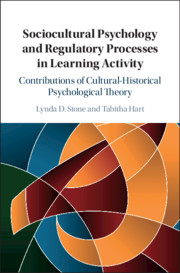 Sociocultural Psychology and Regulatory Processes in Learning Activity
Sociocultural Psychology and Regulatory Processes in Learning Activity Published online by Cambridge University Press: 30 September 2019
In Chapter 1, we present an overview of Vygotsky’s cultural-historical activity theory (CHAT), including an explanation of how regulatory processes arise from the routine practices of social life. As part of this overview, we provide an explicit definition of cultural practices. To elaborate how a practice perspective is beneficial for understanding behavioral regulation, we describe how basic elements of an activity theoretic framework capture defining elements of a social practice. This framework offers a useful model for conceptualizing and observing how social practices come into existence and bring/create contextual resources that influence behavioral regulation. These resources are contextually embedded and include such elements as cultural tools, sign systems and symbols, goal-directed activities, and tasks. To better understand how regulatory processes emerge from participation in a community’s valued activities, we offer definitions of self-, other-, and co-regulation from a practice perspective.
To save this book to your Kindle, first ensure no-reply@cambridge.org is added to your Approved Personal Document E-mail List under your Personal Document Settings on the Manage Your Content and Devices page of your Amazon account. Then enter the ‘name’ part of your Kindle email address below. Find out more about saving to your Kindle.
Note you can select to save to either the @free.kindle.com or @kindle.com variations. ‘@free.kindle.com’ emails are free but can only be saved to your device when it is connected to wi-fi. ‘@kindle.com’ emails can be delivered even when you are not connected to wi-fi, but note that service fees apply.
Find out more about the Kindle Personal Document Service.
To save content items to your account, please confirm that you agree to abide by our usage policies. If this is the first time you use this feature, you will be asked to authorise Cambridge Core to connect with your account. Find out more about saving content to Dropbox.
To save content items to your account, please confirm that you agree to abide by our usage policies. If this is the first time you use this feature, you will be asked to authorise Cambridge Core to connect with your account. Find out more about saving content to Google Drive.